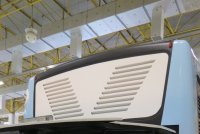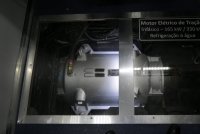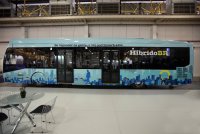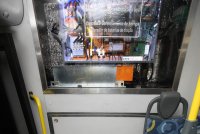
The Brazilian city of São Bernardo do Campo in São Paulo State has seen the launch of its first bus to be powered totally by electric battery. Driven by an 18-metre long battery, which is believed to be the first of its kind in the world, the vehicle can operate all day long without emitting any pollutant. The bus, designed by Eletra, is equipped with a WEG water-cooled traction motor and a water-cooled traction inverter as well as other equipment.
Named the ‘E-Bus', the vehicle can run for 200km, powered by the charge delivered from the lithium batteries. Plus, in addition to being environmentally friendly, the vehicle does not need to be connected to a power line to run (unlike the traditional trolley bus) and this system provides more flexibility and reduces the high maintenance costs associated with the power line type vehicles.
Demonstrating efficient operation and a high cruise range the E-Bus also relies on regenerative braking delivered via the WEG inverter. A regenerative brake is an energy recovery mechanism which slows a vehicle down by converting its kinetic energy into another form, which can be either used immediately or stored until needed. This contrasts with conventional braking systems, where the excess kinetic energy is converted to heat by friction in the brake linings and therefore wasted. Using WEG inverter technology the energy that would otherwise be lost is stored in the vehicle’s batteries to make it even more efficient.
Contributing to the flexibility and high availability of the vehicle is the fact that the 14 batteries, which are located on the roof of the bus, take just three hour to be fully recharged; however, the vehicle also features a ‘fast charge’ system which provides an extra 11-km running distance in only five minutes. At the end of each journey, the bus receives the fast charge at the terminal, while the passengers get on board. When the bus is not needed to depart immediately the batteries can be fully re-charged.
The water-cooled traction motor was developed to meet the project requirements, with a specially designed and lightweight fixing system. The water-cooled, CFW11T traction inverter is specifically for vehicles such as buses, light rail vehicles, trains and trucks. However, it’s not just the motor and the inverter that are supplied by WEG, as the company is also able to supply the compressor motors, hydraulic pump, inverters for the air conditioning system and auxiliary motors.
The expectation of the São Paulo Government is to replace its diesel fleet and the trolley buses with the electric battery bus within a year. Currently the E-bus is being tested but it is expected to be in full operational use by the beginning of 2014.
About WEG
A global major in the power distribution, automation and control sectors, WEG has just celebrated its 50th birthday. The company’s global sales now exceed the US$3-billion mark, representing increasing global success across a wide range of product groups, including the latest generation of transformers, LV control gear, generators, gear motors, inverter drive systems, soft starters, LV and HV motors, ATEX- compliant explosion proof motors, smoke extraction motors and full turnkey systems. In addition, WEG has recently made a significant strategic expansion of its product portfolio, following the establishment of a joint venture for the manufacturing of wind turbines and the purchase of an Austrian gearbox manufacturer, WATT Drive







